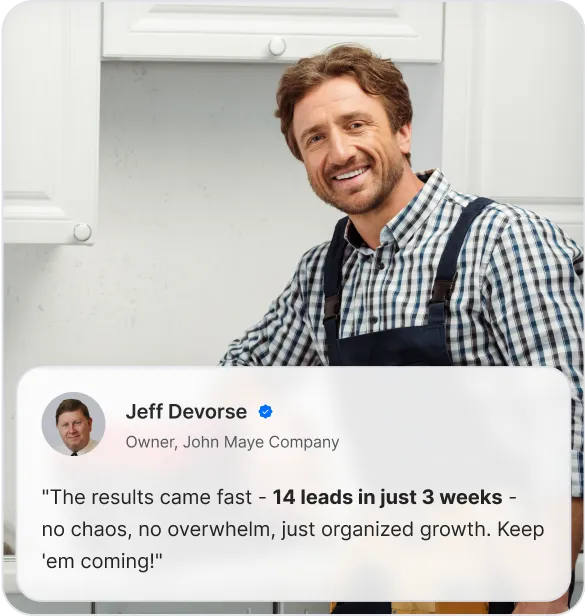Most manufacturers choose sales reps because the math seems straightforward: no base salaries, no benefits, commission-only payments. You only pay when they close deals, which feels like the safest way to control sales costs.
And on paper, it makes perfect sense. Why risk the overhead of building an internal sales team when you can tap into existing rep networks that already have relationships in your target markets?
But there's an assumption built into this logic that many manufacturers don't examine closely enough: that commission-only payment actually guarantees efficient use of your resources.
Here's what we've observed working with manufacturers across different industries:
While you're not paying unsuccessful reps a salary, you are paying in lost time-to-market, delayed revenue, and missed opportunities with better prospects.
What Are Manufacturers' Representatives? (The Basics You're Looking For)
If you're researching this topic, you need to understand exactly what you're considering before weighing the strategic implications.
What Are Manufacturers’ Representatives?
A manufacturers' representative can be either an individual sales professional or a sales agency/firm that represents your products in specific markets or territories.
These external sales partners (also called manufacturer sales reps, rep firms, or independent sales agencies) work commission-only, they earn nothing unless you sell. Unlike direct employees, they operate as independent contractors whether working solo or as part of a multi-person agency.
Here's how these arrangements typically work in practice:
How Manufacturer Reps Work
The business model is straightforward, but the operational details determine whether this approach works for your specific situation.
1. Commission-Only Structure: No Base Salary, No Benefits
Manufacturer reps operate as independent contractors, typically earning 3-15% commission on sales depending on your industry and product complexity. You pay no salary, benefits, or overhead costs. This structure transfers financial risk from you to the rep, if they don't perform, you don't pay.
2. Multi-Line Representation: Carrying Complementary Product Portfolios
Most reps carry 8-20 complementary (non-competing) product lines from different manufacturers. For example, a rep selling industrial pumps might also represent filtration systems, control valves, and monitoring equipment. This portfolio approach gives them more reasons to visit the same customers and potentially increases their earning potential per sales call.
The Apparent Financial Appeal
This commission-only structure creates two immediate cost advantages that make manufacturer reps attractive to most manufacturers evaluating their options.
Variable Costs That Scale With Sales Performance
Traditional sales employees cost you whether they sell or not. A $75,000 salary plus benefits costs roughly $100,000 annually regardless of results. With reps, your sales costs only occur when revenue comes in, creating a direct correlation between expense and performance.
No Overhead for Salaries, Benefits, or Training
Beyond commissions, reps handle their own expenses: travel, entertainment, trade shows, business development, and ongoing education. They invest their own time and money into relationship building, territory development, and product knowledge acquisition.
So far, the manufacturer rep model sounds like the perfect solution, all the benefits of a sales force with none of the overhead risks. But this is where most manufacturers stop their analysis, missing critical considerations that only become apparent after working with reps for 12-18 months.
The Hidden Problem With Relying on Manufacturer Reps Alone

Yes, manufacturer reps only get paid when they close deals. Your financial ROI seems protected. But here's the catch: you're still dependent on their priorities, their existing relationships, and their ability to identify and pursue the right opportunities.
The Time ROI Problem: While your money might be "safe" with commission-only reps, your time to market isn't. Reps work multiple lines, chase leads across their entire portfolio, and may spend months on prospects that never convert, all while your growth timeline ticks away.
While they're chasing uncertain deals, your growth timeline extends and competitive windows close.
The Dependency Risk You're Not Calculating
Beyond the obvious financial considerations, there are strategic vulnerabilities that many manufacturers don't fully evaluate when choosing the rep model.
Multi-Line Priorities: Where Does Your Product Rank?
When a rep carries 15 product lines, your products compete for attention within their own portfolio. A rep might prioritize a $50,000 equipment sale over your $5,000 component sale, even if your component has a higher probability of closing. Their economic incentives don't necessarily align with your growth priorities.
Relationship Ownership: What Happens When Reps Change?
Customer relationships belong to the rep, not to you. When reps retire, change territories, or drop your line, those relationships often leave with them. You're building someone else's asset rather than your own market presence.
The Lead Quality Gap
Even motivated, experienced reps face a fundamental challenge that the commission-only model doesn't solve: they still need to find and qualify prospects before they can sell to them.
Cold Prospecting vs. Warm, Qualified Opportunities

Manufacturer reps must divide their time between prospecting activities: researching companies, making cold calls, attending trade shows, and following up on unqualified leads, and actually selling to qualified prospects.
The more time they spend on prospecting, the less time they have available for closing deals. While you're not paying them during prospecting time, you are paying in delayed results and extended sales cycles.
Why Even Great Reps Struggle Without Marketing Support
The best reps are relationship builders and deal closers, not necessarily lead generation experts. Many excel at nurturing warm prospects but struggle with the modern digital research behaviors of technical buyers.
Today's engineering and procurement professionals do extensive online research before engaging with sales reps, but most reps lack the marketing tools and content to influence this early research phase.
This brings us to an important strategic decision point: given these inherent limitations with the rep-only model, what alternatives should manufacturers consider?
The Smarter Strategy: Marketing-Driven Sales (With or Without Reps)
Instead of choosing between expensive internal teams or uncertain external reps, build a marketing engine that creates qualified opportunities. Then your sales approach, whether internal team or manufacturer reps, focuses on high-probability conversations instead of cold calling.
How This Changes Everything: Marketing identifies prospects, nurtures them through educational content, and qualifies their buying readiness. Your sales resources (internal or external) work warm leads with clear buying signals instead of chasing anyone who might possibly need your product.
Marketing + Internal Sales Team: The Control Advantage
When you combine marketing-generated leads with internal sales teams, you create a controlled, predictable growth engine with two key advantages.
Qualified Pipeline Feeding Dedicated Product Experts
Internal sales teams receiving marketing-qualified leads can focus entirely on your products, understand your technical specifications completely, and represent your brand exactly as you intend. When they're working warm prospects instead of cold territory, conversion rates typically improve 40-60%.
Full Brand Control and Relationship Ownership
You control the entire customer experience from initial contact through post-sale support. Customer relationships become company assets rather than individual rep assets, creating sustainable competitive advantages and higher customer lifetime values.
Marketing + Manufacturer Reps: The Efficiency Play
Even if you choose to work with manufacturer reps, marketing support dramatically improves their effectiveness and your results.
Giving Reps Warm Leads Instead of Cold Territory
When you provide reps with marketing-qualified leads, their effectiveness increases dramatically. Instead of spending 60% of their time prospecting, they can focus on relationship building and deal closure. This often results in shorter sales cycles and higher conversion rates.
Higher Rep Performance When They're Not Prospecting
Reps perform best when they're selling, not prospecting. Marketing support allows them to leverage their relationship skills and product knowledge rather than spending time on activities they may not excel at or enjoy.
Understanding these dynamics helps determine whether manufacturer reps align with your specific growth objectives and market conditions.
When Manufacturer Reps Make Sense (And When They Don't)
The strategic context of your business determines whether reps provide clear advantages or create unnecessary limitations.
Geographic Expansion Without Infrastructure Investment
There are specific scenarios where manufacturer reps provide clear strategic advantages over building internal capacity.
Testing New Markets Before Full Commitment
Reps provide market entry without requiring significant upfront investment in local hiring, office space, or market development. This approach works well when you're testing demand in new regions or industries before committing resources to direct market development.
Leveraging Existing Relationships in Established Territories
Established reps bring immediate access to decision-makers you might spend years trying to reach directly. In mature markets where relationships drive purchase decisions, rep networks can accelerate your market penetration significantly.
The Limitations Most Manufacturers Overlook
However, the rep model also creates constraints that can limit your growth potential in certain situations.
Divided Attention Across Multiple Product Lines
Reps follow their own sales methodologies, pricing discussions, and customer service approaches. While this might work fine for commodity products, complex technical solutions often require more controlled sales processes to ensure proper solution positioning and pricing discipline.
Limited Control Over Sales Process and Customer Experience
Reps excel at territory coverage but may lack deep technical expertise in your specific products. This trade-off works well for standard products but can be problematic for complex solutions requiring consultative selling or technical problem-solving.
Regardless of which sales model you choose, marketing support amplifies effectiveness by improving lead quality and reducing prospecting time.
Building Marketing That Multiplies Any Sales Strategy
Whether you work with internal teams or external reps, strategic marketing creates qualified opportunities that improve conversion rates and shorten sales cycles.
The Manufacturing Lead Generation Challenge
Before diving into specific tactics, it's important to understand why traditional marketing approaches fail in manufacturing markets.
Why Technical Buyers Ignore Generic Sales Approaches
Engineering and procurement professionals receive dozens of sales calls weekly. They've developed sophisticated filtering mechanisms to avoid wasting time on irrelevant pitches. Generic outreach, whether from internal reps or external reps, gets filtered out before reaching decision-makers.
Long Sales Cycles and Complex Decision-Making Units
Manufacturing sales cycles often span 6-18 months and involve multiple stakeholders: engineers, procurement, operations, and finance. Success requires nurturing relationships with different personas over extended periods, something traditional sales approaches handle inefficiently.
Given these realities, the question isn't whether to use manufacturer reps or not—it's how to set them up for success regardless of their limitations.
How to Make Manufacturer Reps Actually Work: The Marketing Foundation They Need
Whether you work with manufacturer reps or build internal teams, the fundamental challenge remains the same: most sales approaches fail because they start with cold prospects instead of warm, qualified opportunities.
Here's how to fix that.
The companies getting the best results from manufacturer reps aren't just handing them territories and hoping for the best, they're providing them with systematic marketing support that transforms how reps spend their time and dramatically improves their conversion rates.
Marketing Strategies That Transform Rep Performance
The most successful manufacturer rep relationships we've seen involve companies that build marketing engines specifically designed to support their reps with qualified, warmed-up prospects.
Content Marketing That Pre-Educates Your Rep's Prospects
Technical buyers research solutions extensively before engaging with any sales reps. When you create educational content addressing their specific challenges, application guides, technical comparisons, case studies, you position both your company and your reps as trusted resources rather than just another vendor cold-calling.
This approach means that when your manufacturer rep finally connects with a prospect, that buyer has already consumed your educational content, understands your solutions, and is further along in their buying process.
Instead of starting with "Let me tell you about our products," reps can start with "I saw you downloaded our guide on optimizing pump efficiency, what specific challenges are you facing in your facility?"
SEO That Captures Prospects When They're Actively Researching
Engineers search for specific technical specifications, application guidance, and problem-solving approaches. When you optimize content for these technical search queries, you capture high-intent prospects at the exact moment they're evaluating solutions.
These prospects then enter your marketing system, get nurtured with relevant content, and eventually become marketing-qualified leads that you can pass to your manufacturer reps.
Instead of reps spending their time prospecting, they spend that time building relationships with prospects who already understand your value proposition.
Account-Based Marketing for High-Value Prospect Development
For large accounts or complex solutions, account-based marketing (ABM) focuses resources on specific target companies rather than broad market outreach. This approach works exceptionally well with manufacturer reps because it aligns perfectly with their relationship-building strengths.
ABM combines personalized content, targeted advertising, and coordinated outreach to engage multiple stakeholders within priority accounts simultaneously. Your marketing identifies and warms up key decision-makers, then your manufacturer rep leverages their relationship skills to convert those warm prospects into customers.
The Technology That Makes Rep Success Predictable
Modern marketing technology creates opportunities for precision and efficiency that transform how manufacturer reps operate.
Sales Intelligence That Times Rep Outreach Perfectly
Marketing tools provide detailed insights into prospect behavior: which content they've consumed, how frequently they visit your site, which team members are researching solutions.
This intelligence allows your manufacturer reps to time their outreach perfectly and customize their approach based on demonstrated interest.
Instead of reps making cold calls hoping to catch someone at the right time, they're reaching out to prospects who have already shown buying signals through their digital behavior. This dramatically improves connection rates and shortens sales cycles.
Integrated Systems That Ensure No Prospects Fall Through Cracks
When marketing and sales systems integrate properly, lead handoffs become seamless, follow-up becomes systematic, and no prospects disappear into the void.
Whether you're working with internal reps or external manufacturer reps, integrated systems ensure consistent follow-up and relationship nurturing throughout extended manufacturing sales cycles.
Your manufacturer reps receive not just contact information, but complete prospect intelligence: what content the prospect has consumed, which solutions they've researched, who else from their company is involved in the evaluation, and what stage they're at in their buying process.
The Answer: It's Not About the Reps, It's About What Feeds Them
Manufacturer reps aren't automatically the answer to sales growth, nor are they necessarily the wrong choice.
The deciding factor isn't rep vs. internal team, it's whether your chosen sales approach receives qualified opportunities or wastes time on cold prospecting.
If You're Considering Manufacturer Reps:
- Evaluate whether they'll receive marketing support or rely solely on cold prospecting
- Assess how your product priority ranks within their portfolio
- Determine ownership of customer relationships and territory development
If You're Building Internal Capacity:
- Calculate the full cost of lead generation, not just sales team overhead
- Plan for 12-18 month ramp-up periods before expecting full productivity
- Consider marketing investment as essential infrastructure, not optional enhancement
The Hybrid Approach Many Choose:
Start with marketing-driven lead generation feeding manufacturer reps in new territories. As territories prove viable and relationships develop, transition high-potential regions to internal teams while maintaining rep coverage in developing markets.
Your immediate next step: Audit your current lead generation process. Whether you choose reps or internal teams, improving lead quality will improve results more than changing sales structure alone.
The companies achieving the fastest, most sustainable growth aren't just choosing between sales models, they're building systematic approaches that make any sales model more effective.
Building a marketing engine for manufacturing doesn't have to be overwhelming.
At Gushwork, we specialize in creating lead generation systems specifically designed for technical products and B2B manufacturing companies. We understand the unique challenges of reaching engineers, procurement teams, and decision-makers in industrial markets.
Whether you're looking to support your existing manufacturer reps with qualified leads or build a pipeline for an internal sales team, the foundation remains the same: strategic content marketing, technical SEO, and targeted outreach that speaks directly to your buyers' research process.
Want to explore what a marketing-driven growth strategy could look like for your manufacturing company?
We'd be happy to discuss your specific situation and share insights on how companies in your industry are successfully generating qualified leads. No pressure, no pitches, just a conversation about what's working in manufacturing marketing today. Let’s connect!





















.webp)








.webp)
.svg)


.svg)
.svg)
.svg)




.svg)





.svg)